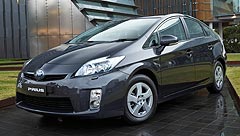Future models - Honda - Jazz - HybridHonda Jazz hybrid more efficient than PriusFacing the future: Honda's Jazz hybrid will emit just 77g/km of CO2. First Jazz hybrid details show Honda's light-sized eco-car to be greener than Prius26 Jul 2010 HONDA has revealed the first official details of its upcoming Jazz hybrid, which show the light-sized petrol-electric model will offer lower fuel consumption and CO2 emissions than Toyota’s hybrid icon, the Prius. Set for release in Japan, where the Jazz is known as the Fit, in October and confirmed to be under consideration for launch in Australia, the Jazz hybrid officially emits just 77 grams of CO2 per kilometre. Honda Australia spokesman Mark Higgins told GoAuto last week the Jazz hybrid would be considered for local release once the Insight, CR-Z and next-generation Civic hybrid were on sale in Australia, when the company could assess market demand “and see what the opportunities are for a light hybrid”. Since its launch last year the MkIII Prius’ official average fuel consumption of 3.9 litres per 100km has been bettered by a number of new models, including Ford’s diesel-powered Fiesta Econetic light hatch, which for now remains Australia’s most fuel-efficient new model with 3.7L/100km. However, until now the Prius has always retained the high ground in terms of environmentally harmful CO2 emissions over its most frugal (and often diesel-powered) rivals, with an average CO2 output of just 89g/km. The smaller Jazz hybrid - which could be released here following the local launch of Honda’s new hybrid Insight hatch late this year, the CR-Z hybrid coupe in the second half of 2011 and the redesigned Civic Hybrid, which is due to emerge globally next year - now lowers that mark by no less than 12g/km, while also using less fuel.  Left:Toyota Prius. Left:Toyota Prius.Official Honda documents state the Fit Hybrid returns fuel economy of just 30km/L (3.33L/100km) according to Japan’s 10/15 fuel consumption standard, or 26km/L (3.85L/100km) when measured using the JC08 standard. The same documents show the Fit Hybrid is powered by a 65kW/121Nm SOHC eight-valve i-VTEC 1.3-litre petrol engine matched with a 10kW/78Nm synchronous AC motor to deliver total outputs of 75kW and 199Nm. That compares with 85kW/170Nm from the current Civic Hybrid’s 1.3-litre petrol-electric drive system, a version of which also powers the Insight and CR-Z. The 1100kg Jazz hybrid weighs about 120kg less than 1220kg Civic Hybrid, however, meaning its 10kW peak power deficit should be more than compensated for its circa-20Nm increase in maximum torque. Most interestingly, however, while next year’s next-generation Civic Hybrid will be the first petrol-electric Honda to feature a lithium-ion (Li-Ion) battery – instead of the Nickel Metal Hydride (Ni-MH) battery employed by the Prius, Insight, CR-Z and current Civic Hybrid - official documents seen by GoAuto clearly state the Fit Hybrid will come with a Nickel Hydrogen battery. Pioneered in the 1970s and now commonly employed in the aerospace industry, the use of Nickel Hydrogen (Ni-H2) battery technology would give the Jazz hybrid a significant point of difference from other petrol-electric models. Another significant difference will be the light-sized Jazz hybrid’s price, particularly compared to hybrid models currently available, including $40,000-plus Prius, a range of Lexus hybrids starting with the RX450h SUV ($89,788) and Porsche’s new Cayenne S Hybrid ($159,900). Three versions of the Fit Hybrid will be available in Japan, priced between 1,480,000 and 1,980,000 yen including all taxes ($A18,860 and $A25,230), representing a purchase price premium of only about $2550 for the hybrid version of the Jazz in Japan. In its domestic market, the Fit Hybrid will be about $2800 more affordable than the entry-level CR-Z and about $3300 cheaper than the Insight starting price.  Read moreJazz pricingMotor industry news |
Click to shareHonda modelsResearch Honda Jazz pricingMotor industry news |















Facebook Twitter Instagram